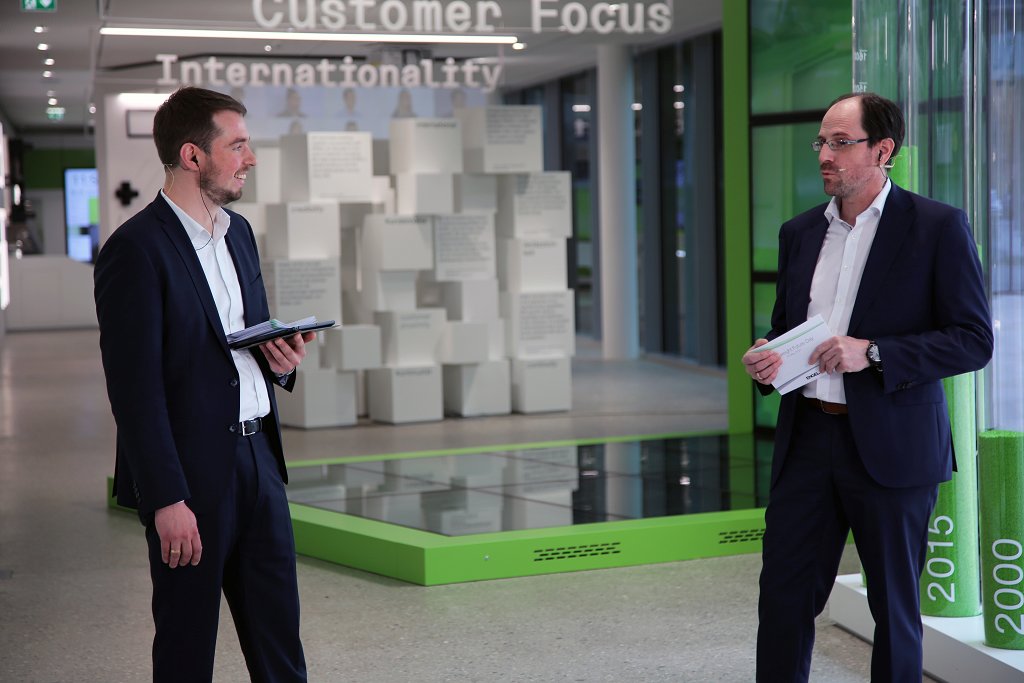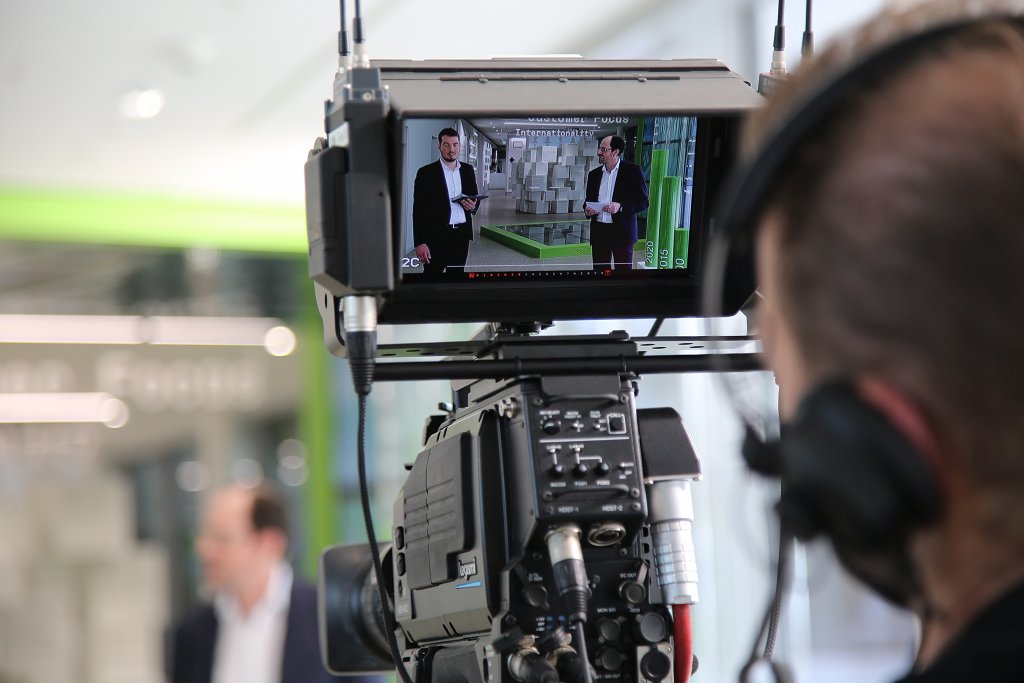International audience at ENGEL Lightweight Future Day
21.05.2021
Lightweight is booming. It plays a central role in achieving climate protection targets. The Lightweight Future Day 2021, which was hosted by machine manufacturer and system solutions provider ENGEL in May, once again made it clear that lightweight is a key technology en route to a CO2-neutral world – and that thermoplastics will play a major role in this.
Top-class experts from all important user industries, such as automotive, bicycle and motorcycle construction, aviation, and the sports and leisure industry, as well as representatives from renowned research institutes presented state-of-the-art solutions and approaches at the Lightweight Future Day 2021. More than 500 attendees gained valuable insights from a total of 15 keynotes presenting all facets of current developments and trends in lightweight, and participated in the discussions. Each keynote was followed by a Q&A session moderated by Dr. Norbert Müller, Head of Development smart machine at ENGEL, and Dr. Bastian Brenken, Managing Director of Composites United. The two industry experts guided the audience through the programme with a great deal of professional expertise and created a relaxed and entertaining conference atmosphere. Due to the ongoing Corona pandemic, the Lightweight Future Day was held as a virtual event this year. The participants mainly came from Europe, with a focus on Germany, the UK and the Benelux countries, but "there were even some lightweight experts from the USA who were not put off by the conference time, which was early in the morning for them," as Christian Wolfsberger, Business Development Manager Lightweight Composites at ENGEL and organiser of the Lightweight Future Day, points out.
 Dr. Norbert Müller, Head of Development smart machine at ENGEL (right) and Dr. Bastian Brenken, Managing Director of Composites United e.V. (left) guided participants through the program and moderated the Q&A sessions.
Dr. Norbert Müller, Head of Development smart machine at ENGEL (right) and Dr. Bastian Brenken, Managing Director of Composites United e.V. (left) guided participants through the program and moderated the Q&A sessions.
Thermoplastic composites accelerate series production
Thermoplastic composites and the matching production technology make high-volume series production far easier, as Michael Thienel, an expert in the development of door solutions at automotive supplier Brose, explained in the first keynote: "With an intelligent mix of materials, we have succeeded in developing an innovative door system here that sets new standards in lightweight, functionality and flexible design. Compared to legacy steel-based products, we save up to five kilograms, that is, 40 percent of the weight, while maintaining the same crash safety. In addition, we have achieved a wall thickness of just 0.6 millimetres." His company has supplied one million door modules made of fibre-reinforced thermoplastics (thermoplastic sheet) to Ford annually since 2018. Today, Brose is already on the threshold of series production with the next generation of door modules: the new structural element replaces other steel-based door elements. In total, this saves a further kilogram of weight per car door, and the system is also more cost-effective as the steel element.
Many keynotes at the Lightweight Future Day show that the path to state-of-the-art lightweight is often via thermoplastic processing. FACC, a specialist for lightweight components in aircraft construction, also backs thermoplastics. The company's special focus is on the future market of "Urban Air Mobility", manned air cabs and unmanned drones in urban air traffic, as Rene Adam, the company's Director Research & Technology, explained. Production volumes of 5,000 to 30,000 components per year are expected. These are significantly higher figures compared to parts production for larger aircrafts, which is around 1,000 units per year. Due to their long curing times, the thermosets primarily used in aircraft construction to date would be unable to meet the short cycle times required here.

Recycling capability makes lightweight more sustainable
But thermoplastics will probably also play a greater role in traditional aircraft construction in the future, as the aviation industry has set itself the goal of achieving climate neutrality by 2050. Rene Adam: "The production processes in the aviation industry will totally change. Hybrid casting, cold bonding and rapid forming have not yet become standard processes here. We need to significantly improve cost structures and production cycles. These are the reasons that lead us at FACC to believe that thermoplastics will be the key material for fibre composite plastics in the aviation industry looking forward."
Another topic was common ground in many of the presentations: the excellent recyclability of thermoplastics compared to the more limited recyclability of thermoset fibre composite materials. Georg Käsmeier, Managing Partner with Forward Engineering, pointed out that the EU is looking to make the circular economy the norm as part of the Green Deal. "Now is the right time to shift from linear to circular thinking in your product development and to consider the recycling process as early as in the product design stage," he urged conference participants. As part of a study, his company compared the CO2 footprint in the production of a brake pedal based on primary thermoplastics, bio-based materials and recycled thermoplastics. The CO2 savings potential of using thermoplastics with recycled content was found to be significant. "We believe that thermoplastic materials have great potential in terms of sustainability. To leverage this, recycling processes now need to be established on an industrial scale. But we do see that this challenge is being addressed by industry," said Käsmeier.
Thermoplastic lightweight parts in one go
Due to the increasing importance of thermoplastics in lightweight, ENGEL has invested heavily in technologies and systems for processing thermoplastic composites in recent years. "We are the first company in the world to be able to offer a fully integrated process that starts with a UD-tape laying cell and finishes with a fully consolidated, overmoulded thermoplastic lightweight component," said Paul Zwicklhuber, development engineer Composite Processing at ENGEL, in his presentation. The tape laying cell relies on the pick-and-place principle. This means that tapes can be deposited and spot-welded together at three- to four-second intervals. Since the quality of the stack depends largely on the accuracy of the tape positioning, ENGEL has equipped the laying cell with a measuring system with high-resolution camera technology. Downstream of this there is a consolidation unit which consolidates the thermoplastic tape fabrics in the injection moulding cycle. Consolidation can be seamlessly integrated into the overall process, which significantly increases efficiency in the production of tailor-made tape solutions.
ENGEL organomelt is the core of the integrated process. Thermoplastic fibre composite prepregs such as UD-tapes and organic sheets are formed and functionalised here. Functional elements, such as reinforcing ribs or assembly elements can be over-moulded immediately after thermoforming using a thermoplastic from the matrix material group. This enables a highly integrated and fully automated production process, while at the same time the process simplifies recycling of the parts at the end of their useful life. The organomelt process is also used in Brose's door module production.
The use case of Swiss-based Svismold showed that lightweight materials can also still benefit advantages even if weight is not an issue. The company was able to convince a manufacturer of surfboards to replace the previous thermoset fins with a fin made of thermoplastic fibre composites based on UD-tapes. It turned out that the new fin offered unparalleled steering precision characteristics. One reason for this is the precisely calculated force flows in the part, which can be reproduced exactly in the part as the use of UD-tape ensures the fibre alignment, while at the same time reducing production costs. The surfboard with the new fin received an enthusiastic welcome from the surfing community.
An exchange is important – personally and across industries
The exchange of experience and knowledge between machine manufacturers and system suppliers, material suppliers, mould makers, researchers and developers is what makes the ENGEL Lightweight Future Day so valuable for the participants. On top of this, there is an exchange between industries which are otherwise totally different but are looking for solutions to similar challenges.
"Even though the virtual platform has achieved a particularly high level of coverage this year, personal contacts are still important for us," says Christian Wolfsberger. "We look forward to offering the Lightweight Future Day again next year as a face-to-face or hybrid event, and to welcoming as many participants as possible to our location in Schwertberg."
For more information, please visit www.engelglobal.com


































